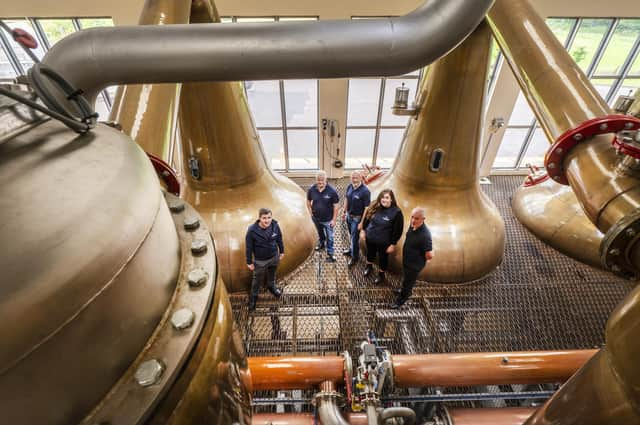How Chivas Brothers is shaping the future of Scotch


Just over 200 years ago the Excise Act 1823 was introduced and changed the face of Scotch whisky from a fragmented, illicit trade to what is now a global concern.
One of the biggest names in the industry is Chivas Brothers, which is steeped in a rich heritage. Among its portfolio of world-renowned brands is The Glenlivet. Founded in the early 19th Century in Speyside, it became the first legal distiller in the Glenlivet parish in 1824. Novelist Charles Dickens even wrote to a friend urging them to try the “rare old Glenlivet”.
Now, Chivas Brothers is committed to shape the future of Scotch for the next 200 years and beyond. Sustainability and protecting Scotland’s natural resources and landscape that imbue whiskies with their distinct flavour is at the heart of what the company does.


Brian MacAulay, malt distilling and operations director at Chivas Brothers, and also chair of the board at Developing the Young Workforce Moray, says: “For the future of Scotch we need to be successful in sustainability. For us to be here in 200 years’ time we have to look after nature, the environment, and the water sources around our distilleries and communities. We’ve done a good job of this for the last 200 years, and it’s now all about how we set ourselves up for what lies ahead.
“Our future consumers are the young people of today who are very aware of their environment. For us to be aligned with them we need to take cognisance of our environment and what it will look like in, say, 30 years time.”
Sustainability and the environment
Chivas Brothers has ambitious plans around sustainability, including a target of becoming carbon neutral in distillation by the end of 2026.The firm has announced more than £60 million in planned investment over the next three years, which includes the implementation of heat recovery technology at all viable sites to change how energy is used in distillation.
As well as this investment furthering Chivas Brothers’ own sustainability targets, the company is putting collaboration ahead of competition to enable a greener future for the whisky industry. In July, it made the learnings of its heat recovery technology “open source” for the wider industry, followed by a two-day open house event at its Glentauchers distillery in October. More than 130 industry peers attended to meet Chivas Brothers’ engineering team and learn more about the application of heat recovery technology in distillation, including mechanical vapour recompression (MVR) and thermo vapour recompression (TVR), designed to capture and recycle heat generated in the distillation process that would otherwise go to waste.
Chivas Brothers estimates that if these technologies were applied by the industry’s malt distilleries, this could equate to a saving of 1,756Gwh per annum – enough to power 605,000 average homes for a year, and more than the number in Edinburgh and Aberdeen combined.
MacAulay explains: “It’s obviously an ambitious target to become carbon neutral in distillation by the end of 2026, and we’re not a small company. We have a number of distilleries, including, for example, The Glenlivet which is celebrating 200 years in 2024. What we’re doing relates to the local environment as well as the global one.
“Firstly, we’re working to reduce the energy requirement in distillation. This key driver has led us to innovate with the application of MVR technology in distillation, which has allowed us to reduce our carbon emissions at Glentauchers Distillery by about 53 per cent. That’s a significant shift in sustainability and is helping us move to alternative energy sources, such as electricity.”
In other initiatives, Chivas Brothers is promoting and protecting biodiversity in the Scottish landscape through strategic partnerships and initiatives. “As an example, we’ve planted about 14 hectares near our distilleries and operations, including wild flowers and trees,” explains MacAulay. “We’ve done additional things such as tree planting locally and removing invasive species. We’re also working with experts, including farmers, on sustainable agriculture.”
Another goal for the company is to achieve 100 per cent recyclable, reusable or compostable packaging by the end of 2025 and it reports that it is already 95 per cent of the way there.
Products, people and places
Innovation in the widest sense, from new products, fresh distillery locations, and developing a more diverse workforce, is key to shaping the future of Scotch.
And Chivas Brothers’ products are designed to appeal to an increasingly diverse whisky fan base. The company recently launched The Glenlivet Twist & Mix Cocktails, described as a ground-breaking ready-to-serve, mixed whisky-based bottled range. Cleverly, pioneering technology in each bottle’s cap releases natural flavourings into The Glenlivet to create the mixed drink. The range debuts with Old Fashioned and New Manhattan cocktails to take the strain out of hosting at home.
In another development, Chivas Brothers is building its first Islay distillery, which will produce a single malt that celebrates the distinctly smoky and peated profile of the “whisky island”.
MacAulay says: “Islay will complete our award-winning Scotch portfolio. Building a new distillery gives us an opportunity to use all the technologies we’ve developed. We will be a really positive partner on the island and can lead and support others with our sustainability ambitions.”
Turning to diversity, the firm has made great progress in increasing female representation in leadership positions in its manufacturing department. Women now make up 33 per cent of company leaders in manufacturing, up from 10 per cent in July 2020, and it is on track to reach
40 per cent by 2025 and 50 per cent by 2030.
Concluding on diversity, MacAulay says: “We place an emphasis on being an inclusive, safe and enjoyable space for people to bring their authentic selves to work.”
Find out more at https://bit.ly/419b02k